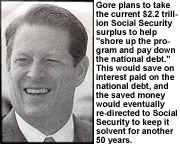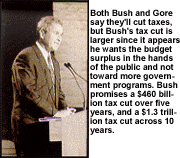Every four years the American public takes an extended lunch hour in November to cast a vote in the presidential election (rumor has it that some people even vote in non-presidential elections, though evidence to support this is lacking). And every four years, the American public has a tough choice, either because each candidate has so much to offer or because each candidate seems more at home in the Big House rather than the White House.
The 2000 election will result in a brand new president. And depending on your point of view toward government, that new president can play a big part in policies that affect your business. How the new president feels about taxes, the economy, health care and the environment can very well influence how easy or difficult it will be to run your business. Or maybe you feel the president is a just a figurehead, and it won’t make a lick of difference if George W. Bush, Al Gore or Pikachu gets elected president. It’s not like the president does anything, right?
Well, history tells us this assertion depends on the president. But for collision repair shops in the year 2000, whoever gets elected president can certainly impact your business. Depending on each candidate’s vision and ability to carry it out, you may see yourself with a very important choice in November. Too bad you have to share that decision with 100 million other voters.

I Promise To…
If candidates for president could keep all their campaign promises, then our roads would be made of yellow bricks and we’d all work in emerald castles. Most people, however, don’t expect candidates to keep all their promises, which is good since most candidates don’t. Three reasons exist for why this happens. First, candidates purposely make many strong, exagerrated promises (some better kept than others) to attract voters. Second, just because a candidate makes a promise doesn’t mean Congress will be willing to carry it out for him. He can say he’s lowering taxes, but it’s Congress who votes on it. And finally, times and issues may change, putting some promises on the back-burner, never to be re-heated again. Despite all this, it’s still important to know what the candidates have promised and what they stand for.
The economy is always a top criterion voters take into account on election day. The current robust economy has made the future look very bright, and the two candidates are fortunate enough to have a strong economy on which to make grand assumptions and subsequent promises. Each one assumes a budgetary surplus over the next 10 years. Bush assumes it to be $4.115 trillion, while Gore expects it to be $3.045 trillion. Each candidate has used these surplus numbers on which to base their economy-related promises. Both candidates plan to set aside about $2.2 trillion of that surplus for Social Security from 2001 to 2010. But wait, there’s more – because politics is never that simple. Gore plans to take the current $2.2 trillion Social Security surplus to help “shore up the program and pay down the national debt.” This would save on interest paid on the debt, and the saved money would be eventually re-directed to Social Security to keep it solvent for another 50 years. Bush, meanwhile, supports privatizing Social Security (putting it in the hands of the public) by letting participants invest a portion of their payroll taxes (the Social Security tax) in the stock market. Bush hasn’t ruled out raising the eligibility age of baby-boomer recipients as a trade-off for this investment. He also opposes an increase in the current payroll tax of 12.4 percent.

How would all this affect your business? For one thing, both candidates seem to be assuring the public that Social Security will be around for awhile. But with the possibility of having people invest their Social Security withholdings, expect a lot of questions from employees. If you thought explaining your 401k was difficult, this may require a four-day class.
Both candidates say they’ll cut taxes, but Bush’s tax cut is certainly larger since it appears he wants the budget surplus in the hands of the public and not toward more government programs. He promises a $460 billion tax cut over five years, and a $1.3 trillion tax cut across 10 years. How can he make such a promise? Well, besides spending less money on federal programs, if his assertion on the budget surplus holds true, there will be enough money to follow through on these cuts. If the assertions don’t hold up, then the candidates could always say, “Hey, it’s not my fault. How was I to know we wouldn’t have a surplus?”
But the budget is one thing the president does have some control over. Each year the president submits his budget proposal, and Congress (the House of Representatives and the Senate) has to do its best to stay within those boundaries. Each candidate has indicated that the budget will be balanced each year, except in cases of national emergency. However, it may make one suspicious to hear candidates promise only a balanced budget while at the same time asserting that a 10-year budget surplus will run into the trillions. This isn’t to say the candidates are liars (A politician who’s a liar? That’ll be the day.), but it does indicate that their promises should be taken with a grain of salt.
When it comes to education, both candidates have stressed more technology in classrooms in an effort to encourage high-tech growth. In other words, if more schools can educate kids on the Internet and teach them to be computer-literate, then we’ll have more people ready to tackle the rapidly growing number of high-tech jobs. It was the high-tech stuff that helped get the economy rolling along over the last decade, so it makes sense to ensure the high-tech industries keep flourishing. How may this affect your shop? Well, with the tech shortage, it’s hard enough to find skilled help. If more youths are encouraged to take high-paying high-tech jobs, the technician shortage may get worse.
The environment is another big issue for the candidates and for collision shop owners, as well. The more strict the environmental legislation, the more difficult it becomes to comply and conduct business efficiently. It’s long been known that Gore’s a strong proponent of environmental protection. He supports a ban on off-shore drilling on undeveloped leases off the California and Florida coasts, and he plans to spend $3 billion to promote “smart growth” in urban areas and to create new parklands and open spaces. Bush supports more state control over environmental policies, while opposing the Kyoto global warming agreement. Gore supports the agreement. The agreement states that developed nations will reduce their greenhouse gas emissions by 5.2 percent during 2008 to 2012. The gases covered include carbon dioxide, methane, nitrous oxide and hydrofluorocarbons. Bush’s support of state-controlled environmental policies means a national initiative like the Kyoto agreement is of little use. What does this mean to you? A Gore presidency would likely mean more proposals to further clean the air and water on a national scale. A Bush presidency means that your compliance obligation depends on the state you live in.
“If Bush wins, I think the EPA will be reined in a bit,” says Bobby Johnson, a Texas shop owner and contributing editor to BodyShop Business. “They and other federal agencies will be held more accountable.”

The Power Struggle
It’s a lot easier to make promises than it is to keep them. Just look at wedding vows. The president can’t just stroll into the Capitol Building, throw down a list of demands and say, “Pass these proposals now or you’re all fired.” It just doesn’t work this way.
The president’s ability to get his proposals passed depends on how skillfully he asserts his power. The president’s power comes from his ability to persuade, his ability to elicit support and his willingness to veto bills he disagrees with that come across his desk. Also, certain circumstances and the condition of the country contribute to – or erode – the president’s power. One thing to keep in mind in this election is how well you think the candidates can use their power to make their promises a reality. A promise isn’t worth anything if the president can’t get Congress or the public to support it.
First, the president must be able to persuade Congress to agree with the matters he’s put on his agenda (i.e. his promises). At the same time, he needs to elicit support from Congress on his agenda. Maybe a congressman doesn’t agree with the president on an issue, but he may support it if the president returns the favor. A president’s attitude may help determine if he’ll get much support. Lyndon Johnson would strongarm congressional members into supporting his proposals. Meanwhile, he also had a majority of Democrats in the House of Representatives to support his agenda. Generally, it’s easier to garner support if your party has control of Congress.
But this isn’t always the case. Jimmy Carter approached the democrat-controlled Congress with a laundry list of proposals in which he made specific recommendations even though he hadn’t conferred with Congress on them previously. The members of Congress — who want to be involved, since government is a power struggle — didn’t like this, and as a result, made things difficult for Carter during his term. But this isn’t to say a divided government (where the president is of one party while Congress is controlled by another) will mean a stalemate is inevitable. For example, Ronald Reagan was able to pass a number of his economic proposals through a democrat-controlled Congress.
Most important may be the condition of the country and certain circumstances that occur while the president is in office. When Franklin Roosevelt took office in 1933, the country was in the midst of the Great Depression, and Congress was willing to pass anything he recommended (the New Deal) in order to stop the bleeding. The circumstances in 1933 were much different than they are now, and who knows if FDR would have been as successful in 2000.
Circumstances that occur while the president is in office also help to enhance or erode his power. With the Civil War, Abraham Lincoln was able to thrive and take control of most facets of govenrment, emerging as a true leader. If he said it, Congress passed it. Fast-forward more than 100 years to the Watergate scandal and the Lewinsky affair. In both of these circumstances, the president had little domestic power while he was being investigated. He couldn’t get public support, and because of that, members of Congress weren’t about to commit political suicide by aligning themselves with a very unpopular president.
If it’s so hard for a president to get his agenda considered, much less accepted, then does it matter who the president is, and should it matter to the collision repair industry?
“Yes it matters who the president is,” says Johnson. “The collision industry is affected in little ways by any national office, and attitude and decency come into play nationwide.”
Choose and/or Lose
So what we’re looking for is a president who can persuade Congress to fall in love with his proposals, who’s in the right place at the right time and who won’t do anything scandalous (or at least get caught for it). If we can find this person, then we can look to see what he’s proposing and decide if that’s what we want. Or we can pick one issue (like abortion or Medicare) and decide based on that. Or just flip a coin.
Writer Mike Lawrence is associate editor of BodyShop Business.
|
So You Think You Can Be President?
It’s said that the great thing about America is that any child can grow up to be president. But there are formal (written down) and informal (those that seem to just happen) rules to becoming president. The formal rules are written in Article II of the Constitution. These rules require a president to be:
|
|
OK, So Maybe I’m a Bit Cynical*
The American political system is corrupt, agonizingly slow, old and out of touch with pretty much … everything. The process of elections and making policy is so convoluted and confusing that to teach about the electoral college in schools requires a semester. How does a bill become a law? I’ve learned about this on a half-dozen separate occasions, and I still really couldn’t tell you. Who’s really in charge? The president? Congress? Who knows? What’s amazing is that policy is actually implemented at all. And you know what’s worse? The American governmental system is the best system the world. Though such a title is the equivalent to winning the “Miss America 80 and Over Pageant,” it doesn’t change the fact that we’re the “best.” Yippee. I majored in political science in grad school, and now I’m more disillusioned with politics than ever before. Being educated on government didn’t enhance my respect for politics. It just left a bad taste in my mouth. Look at the elections. Everything the candidates say has been rehearsed a million times. Each canned answer to each anticipated question is prepared better than a production of “Cats” on the Island of Dr. Moreau. They smile, shake hands and visit Mom and Pop restaurants. “Wow, look. That candidate is visiting a Denny’s. What a man of the people. I’ll vote for him.” Never mind that this “man of the people” hasn’t voluntarily visited a restaurant that didn’t require a suit and tie since 1974. It seems like every election has people voting for “the lesser of two evils.” People always say, “Just once, I’d like a candidate who really speaks his mind. Why can’t we get one of those?” The answer’s simple. Those guys were weeded out a long time ago. They were crucified by the media and the public for “speaking their minds.” A year before the election, a candidate can say, “You know, the war on drugs has been a true waste of money. It has shown no results, the situation has not improved, and frankly, it blows.” People, this is the candidate who speaks his mind! Isn’t this who you wanted? No way. When Joe Schmoe says he wants a candidate who speaks his mind, he really wants a candidate who thinks exactly the same as Joe Schmoe. In other words, “I want a candidate who will speak my mind.” A candidate who speaks his own mind disappears faster than beads and trinkets at Mardi Gras. Since we have 250 million people in this country, equaling roughly 20 million minds, you can see the trouble candidates have in appeasing the electorate. So the best thing to do, if a candidate wants to win, is give rehearsed, middle-of-the-road answers so as to not rock the campaign boat. Campaigning isn’t about winning over people. It’s about pissing off as few of them as you can. I don’t mind if a candidate stays in the middle of the road. In fact, it’s the only way he’ll win. But when the candidate obviously feels one way and says something different because it’ll win votes, I get a bit annoyed. Don’t tell me what I want to hear. Tell me what you want to say. Then I’ll make an informed decision when I vote. Would that be so hard? — Mike Lawrence
*Mike Lawrence’s political views do not necessarily reflect those of BodyShop Business. But they might. If you liked this editorial, then they do. If you didn’t like it, then they don’t.
|
|
The Road to the White House
In the 20th century, seven vice presidents and six governors have become president. Now it appears the 21st century is no different, as a vice president squares off against a governor. If Bush wins, he’ll have pulled off an uncommon feat, emerging victorious despite only previously holding one political office. Also of note is the fact that no collision shop owner has gone on to become president, indicating that they’re way too smart to ever think about taking that job.
|













